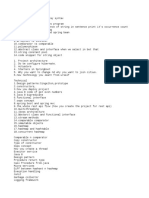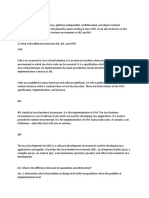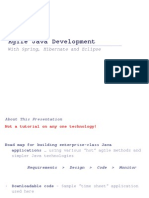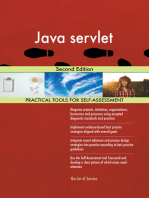Java8 New - Study Guide - Part 3
Uploaded by
Akhilesh PatelJava8 New - Study Guide - Part 3
Uploaded by
Akhilesh Patel4.
Method References
Sometimes, You may have method already available with some logic which you want write
in the Lambda Expression. In this case, you can use existing method instead of duplicating
the code again.
You can use the Existing Method References to re-use the logic.
Method references are a special type of lambda expressions which are used to create
simple lambda expressions by referencing existing methods.
There are 3 types of method references.
1) Static Method Reference
2) Instance method Reference
3) Constructor Reference
A new operator ::(double colon) called as Method Reference Delimiter to specify the
Method References
Static Method Reference:
Allows to access existing Static Methods
Syntax:
Class::staticMethod
Ex:
Hello hello = MyInteger::findSum;
Instance Method Reference:
Allows to access existing Instance or Non Static Methods
Syntax:
ObjRef::instanceMethod
Ex:
MyInteger myIntRef = new MyInteger();
Hello hello2 = myIntRef::findSum;
Constructor Method Reference:
Allows to access constructor of Class to Create the Object
Syntax:
Class::new
Ex:
Hello hello= Course::new;
Java Learning Center 30 Java 8 New Features
Demo1: Files Required:
1. Hello.java 2. MyInteger.java
3. Demo1.java
1)Hello.java
package com.jlcindia.demo1;
/*
* @Author : Srinivas Dande
* @Company: Java Learning Center
* */
@FunctionalInterface
public interface Hello {
public int test(int a, int b);
}
2)MyInteger.java
package com.jlcindia.demo1;
/*
* @Author : Srinivas Dande
* @Company: Java Learning Center
* */
public class MyInteger {
public static int findSum(int a, int b) {
return a + b;
}
}
3)Demo1.java
package com.jlcindia.demo1;
/*
* @Author : Srinivas Dande
* @Company: Java Learning Center
* */
public class Demo1 {
public static void main(String[] args) {
Hello hello1 = (a, b) -> {
int sum = a+b;
return sum;
};
Java Learning Center 31 Java 8 New Features
int sum1 = hello1.test(100, 50);
System.out.println("Sum : " + sum1);
Hello hello2 = MyInteger::findSum;
int sum2 = hello2.test(100, 50);
System.out.println("Sum : " + sum2);
Hello hello3 = Integer::sum;
int sum3 = hello3.test(100, 50);
System.out.println("Sum : " + sum3);
Hello hello4 = Integer::max;
int max = hello4.test(100, 50);
System.out.println("Max : " + max);
Hello hello5 = Integer::min;
int min = hello5.test(100, 50);
System.out.println("Min : " + min);
System.out.println("Done!!!");
}
}
Demo2: Files Required:
1. Hello.java 2. Hai.java
3. MyInteger.java 4. Demo2.java
1)Hello.java
package com.jlcindia.demo2;
/*
* @Author : Srinivas Dande
* @Company: Java Learning Center
* */
@FunctionalInterface
public interface Hello {
public int test(int a, int b);
}
Java Learning Center 32 Java 8 New Features
2)Hai.java
package com.jlcindia.demo2;
/*
* @Author : Srinivas Dande
* @Company: Java Learning Center
* */
@FunctionalInterface
public interface Hai {
public void test(String str);
}
3)MyInteger.java
package com.jlcindia.demo2;
/*
* @Author : Srinivas Dande
* @Company: Java Learning Center
* */
public class MyInteger {
public int findSum(int a, int b) {
return a + b;
}
}
4)Demo2.java
package com.jlcindia.demo2;
/*
* @Author : Srinivas Dande
* @Company: Java Learning Center
* */
public class Demo2 {
public static void main(String[] args) {
Hello hello1 = (a, b) -> {
int sum = a+b;
return sum;
};
Java Learning Center 33 Java 8 New Features
int sum1 = hello1.test(100, 50);
System.out.println("Sum : " + sum1);
MyInteger myIntRef = new MyInteger();
Hello hello2 = myIntRef::findSum;
int sum2 = hello2.test(100, 50);
System.out.println("Sum : " + sum2);
Hai hai1 = (msg) -> {
System.out.println(msg);
};
hai1.test(" Hai Guys!!! ");
Hai hai2 = System.out :: println;
hai2.test(" Hey Guys !!! ");
}
}
Demo3: Files Required:
1. Hello.java 2. Course.java
3. Demo3.java
1)Hello.java
package com.jlcindia.demo3;
/*
* @Author : Srinivas Dande
* @Company: Java Learning Center
* */
@FunctionalInterface
public interface Hello {
public Course test(int a,String b,String c,String d);
}
Java Learning Center 34 Java 8 New Features
2)Course.java
package com.jlcindia.demo3;
/*
* @Author : Srinivas Dande
* @Company: Java Learning Center
* */
public class Course {
private int courseId;
private String courseName;
private String duration;
private String trainer;
public Course() {
System.out.println("Course - 0 arg Con");
}
public Course(int courseId, String courseName, String duration, String trainer) {
System.out.println("Course - 4 arg Con");
this.courseId = courseId;
this.courseName = courseName;
this.duration = duration;
this.trainer = trainer;
}
//Setters and Getters
//toString() method
}
3)Demo3.java
package com.jlcindia.demo3;
/*
* @Author : Srinivas Dande
* @Company: Java Learning Center
* */
public class Demo3 {
public static void main(String[] args) {
//1.Lambda Style
Hello hello1 = (a, b, c, d) -> {
Course course = new Course(a, b, c, d);
return course;
};
Java Learning Center 35 Java 8 New Features
Course course1 = hello1.test(101, "DevOps","60 Hrs","Srinivas Dande");
System.out.println(course1);
//2.Method Refernce Style
Hello hello2= Course::new;
Course course2 = hello2.test(102, "Boot - MicroServices","100 Hrs","Srinivas Dande");
System.out.println(course2);
System.out.println("Done!!!");
}
}
Demo4: Files Required:
1. Hello.java 2. Demo4.java
1)Hello.java
package com.jlcindia.demo4;
/*
* @Author : Srinivas Dande
* @Company: Java Learning Center
* */
@FunctionalInterface
public interface Hello {
public void test(int[] arr);
}
2)Demo4.java
package com.jlcindia.demo4;
import java.util.Arrays;
/*
* @Author : Srinivas Dande
* @Company: Java Learning Center
* */
public class Demo4 {
public static void main(String[] args) {
Java Learning Center 36 Java 8 New Features
int myarr1[] = { 20, 40, 30, 50, 10 };
//1.Lambda Style
Hello hello1 = (arr) -> {
for (int i = 0; i < arr.length -1; i++) {
for (int j = i + 1; j < arr.length; j++) {
if (arr[i] > arr[j]) {
int temp = arr[i];
arr[i] = arr[j];
arr[j] = temp;
}
}
}
};
hello1.test(myarr1);
for (int x : myarr1) {
System.out.println(x);
}
System.out.println("------------------");
int myarr2[] = { 99, 88, 20, 40, 30, 50, 10 };
//2.Method Refernce Style
Hello hello2 = Arrays::sort;
hello2.test(myarr2);
for (int x : myarr2) {
System.out.println(x);
}
}
}
Java Learning Center 37 Java 8 New Features
Demo5.java
package com.jlcindia.demo5;
import java.util.ArrayList;
import java.util.List;
import java.util.stream.Stream;
/*
* @Author : Srinivas Dande
* @Company: Java Learning Center
* */
class Hello {
public static void show(int x) {
System.out.println(x);
}
}
public class Demo4 {
public static void main(String[] args) {
List<Integer> mylist = new ArrayList<>();
mylist.add(30);
mylist.add(20);
mylist.add(50);
mylist.add(10);
mylist.add(40);
Stream<Integer> mystream= mylist.stream();
mystream.forEach(Hello::show);
System.out.println("-------------------");
mylist.stream().forEach(Hello::show); //Static Method Ref Style
System.out.println("-------------------");
mylist.stream().forEach(System.out::println); //Instance Method Ref Style
System.out.println("-------------------");
mylist.stream().forEach( (x) -> System.out.println(x)); //Eambda Style
}
}
Java Learning Center 38 Java 8 New Features
Demo6.java
package com.jlcindia.demo6;
import java.util.ArrayList;
import java.util.List;
/*
* @Author : Srinivas Dande
* @Company: Java Learning Center
* */
class MyNumber {
public static boolean isEven(int number) {
if (number % 2 == 0)
return true;
else
return false;
}
public static boolean isOdd(int number) {
if (number % 2 != 0)
return true;
else
return false;
}
}
public class Demo5 {
public static void main(String[] args) {
List<Integer> mylist = new ArrayList<>();
mylist.add(3); mylist.add(2); mylist.add(5); mylist.add(1); mylist.add(4);
mylist.stream()
.filter(MyNumber::isEven)
.forEach(System.out::println);
System.out.println("-------------------");
mylist.stream()
.filter(MyNumber::isOdd)
.forEach(System.out::println);
System.out.println("-------------------");
mylist.stream()
.filter(a -> a % 2 == 0)
.forEach(a -> System.out.println(a));
System.out.println("-------------------");
Java Learning Center 39 Java 8 New Features
mylist.stream()
.filter(a -> a % 2 != 0)
.forEach(a -> System.out.println(a));
System.out.println("-------------------");
}
}
Demo7.java
package com.jlcindia.demo7;
import java.util.*;
/*
* @Author : Srinivas Dande
* @Company: Java Learning Center
* */
public class Demo6 {
public static void main(String[] args) {
List<Integer> mylist = new ArrayList<>();
mylist.add(3);
mylist.add(2);
mylist.add(5);
mylist.add(1);
mylist.add(4);
mylist.add(6);
mylist.add(7);
mylist.add(8);
mylist.stream()
.filter(a -> a % 2 == 0)
.map(a -> a* a)
.forEach(a -> System.out.println(a));
System.out.println("-------------------");
mylist.stream()
.filter(a -> a % 2 != 0)
.map(a -> a* a)
.forEach(a -> System.out.println(a));
}
}
Java Learning Center 40 Java 8 New Features
You might also like
- FICO Blaze Advisor Decision Rules - How It Works100% (2)FICO Blaze Advisor Decision Rules - How It Works44 pages
- Java Performance Optimization Tips & Interview QuestionsNo ratings yetJava Performance Optimization Tips & Interview Questions12 pages
- Sample Cracking Microservices InterviewsNo ratings yetSample Cracking Microservices Interviews32 pages
- Java Multithreading Interview Questions And AnswersFrom EverandJava Multithreading Interview Questions And AnswersNo ratings yet
- Active Directory Users and Computers - II Additional Domain ControllerNo ratings yetActive Directory Users and Computers - II Additional Domain Controller4 pages
- Hibernate, Spring & Struts Interview Questions You'll Most Likely Be AskedFrom EverandHibernate, Spring & Struts Interview Questions You'll Most Likely Be AskedNo ratings yet
- Mastering Concurrency Programming Java 8 Ebook B012o8s89k PDFNo ratings yetMastering Concurrency Programming Java 8 Ebook B012o8s89k PDF5 pages
- Collections Interview Question: 1. What Is The Collection API?No ratings yetCollections Interview Question: 1. What Is The Collection API?31 pages
- Spring AOP Notes (Aspect Oriented Programming in Spring) PDFNo ratings yetSpring AOP Notes (Aspect Oriented Programming in Spring) PDF44 pages
- Quick Reference Before Appearing For Java InterviewNo ratings yetQuick Reference Before Appearing For Java Interview8 pages
- Course Content of Spring Basics-Spring Boot-MicroServices-Clould and SecurityNo ratings yetCourse Content of Spring Basics-Spring Boot-MicroServices-Clould and Security4 pages
- Agile Java Dev With Spring Hibernate Eclipse100% (4)Agile Java Dev With Spring Hibernate Eclipse117 pages
- Java Spring Boot Microservices Training Content - Manish SinghNo ratings yetJava Spring Boot Microservices Training Content - Manish Singh1 page
- Spring. Springboot.: What Are The Spring Boot Annotations?No ratings yetSpring. Springboot.: What Are The Spring Boot Annotations?13 pages
- Spring MVC Hibernate MySQL Integration CRUD Example TutorialNo ratings yetSpring MVC Hibernate MySQL Integration CRUD Example Tutorial17 pages
- Op 100 Spring Interview Questions and Answers (Part 1)No ratings yetOp 100 Spring Interview Questions and Answers (Part 1)41 pages
- The Saga Pattern in A Reactive Microservices Environment: January 2019No ratings yetThe Saga Pattern in A Reactive Microservices Environment: January 20199 pages
- Microservices Architecture Using Spring Boot and Netflix InfrastructureNo ratings yetMicroservices Architecture Using Spring Boot and Netflix Infrastructure6 pages
- Spring MVC Interview Questions With Answers - HowToDoInJava0% (1)Spring MVC Interview Questions With Answers - HowToDoInJava29 pages
- Java Core Interview in Australia. Questions and Answers. Tech interviewer’s notesFrom EverandJava Core Interview in Australia. Questions and Answers. Tech interviewer’s notesNo ratings yet
- Core Java: Made Simple: A popular language for Android smart phone application, favoured for edge device andFrom EverandCore Java: Made Simple: A popular language for Android smart phone application, favoured for edge device andNo ratings yet
- Installing The PHPBB Forum On Debian Squeezesid LinuxNo ratings yetInstalling The PHPBB Forum On Debian Squeezesid Linux4 pages
- Silo - Tips Medeia o Amor Louco by Euripides Luiz Galdino Victor AwsNo ratings yetSilo - Tips Medeia o Amor Louco by Euripides Luiz Galdino Victor Aws3 pages
- 10 Charts That Will Change Your Perspective On Artificial Intelligence's GrowthNo ratings yet10 Charts That Will Change Your Perspective On Artificial Intelligence's Growth8 pages
- Genie™ 2000 Spectroscopy Software: OperationsNo ratings yetGenie™ 2000 Spectroscopy Software: Operations387 pages
- I Passed RHCSA 8, WOOO! Also Some Tips For Your Exam RedhatNo ratings yetI Passed RHCSA 8, WOOO! Also Some Tips For Your Exam Redhat9 pages
- Awake Security vs. Extrahop Reveal (X) : Network Traffic Analysis: Feature Comparison GuideNo ratings yetAwake Security vs. Extrahop Reveal (X) : Network Traffic Analysis: Feature Comparison Guide10 pages
- Learn PowerShell Scripting in a Month of Lunches: Write and organize scripts and tools, 2nd Edition James Petty 2024 Scribd Download100% (1)Learn PowerShell Scripting in a Month of Lunches: Write and organize scripts and tools, 2nd Edition James Petty 2024 Scribd Download41 pages
- SAP Business One Platform Support Matrix: Release 9.0 and HigherNo ratings yetSAP Business One Platform Support Matrix: Release 9.0 and Higher16 pages
- Quantifying Subjective Data Using Online Q-Methodology SoftwareNo ratings yetQuantifying Subjective Data Using Online Q-Methodology Software10 pages
- Understanding The Basics of Verbal CommunicationNo ratings yetUnderstanding The Basics of Verbal Communication24 pages
- Java Performance Optimization Tips & Interview QuestionsJava Performance Optimization Tips & Interview Questions
- Java Multithreading Interview Questions And AnswersFrom EverandJava Multithreading Interview Questions And Answers
- Active Directory Users and Computers - II Additional Domain ControllerActive Directory Users and Computers - II Additional Domain Controller
- Hibernate, Spring & Struts Interview Questions You'll Most Likely Be AskedFrom EverandHibernate, Spring & Struts Interview Questions You'll Most Likely Be Asked
- Mastering Concurrency Programming Java 8 Ebook B012o8s89k PDFMastering Concurrency Programming Java 8 Ebook B012o8s89k PDF
- Collections Interview Question: 1. What Is The Collection API?Collections Interview Question: 1. What Is The Collection API?
- Spring AOP Notes (Aspect Oriented Programming in Spring) PDFSpring AOP Notes (Aspect Oriented Programming in Spring) PDF
- Quick Reference Before Appearing For Java InterviewQuick Reference Before Appearing For Java Interview
- Course Content of Spring Basics-Spring Boot-MicroServices-Clould and SecurityCourse Content of Spring Basics-Spring Boot-MicroServices-Clould and Security
- Java Spring Boot Microservices Training Content - Manish SinghJava Spring Boot Microservices Training Content - Manish Singh
- Spring. Springboot.: What Are The Spring Boot Annotations?Spring. Springboot.: What Are The Spring Boot Annotations?
- Spring MVC Hibernate MySQL Integration CRUD Example TutorialSpring MVC Hibernate MySQL Integration CRUD Example Tutorial
- Op 100 Spring Interview Questions and Answers (Part 1)Op 100 Spring Interview Questions and Answers (Part 1)
- The Saga Pattern in A Reactive Microservices Environment: January 2019The Saga Pattern in A Reactive Microservices Environment: January 2019
- Microservices Architecture Using Spring Boot and Netflix InfrastructureMicroservices Architecture Using Spring Boot and Netflix Infrastructure
- Spring MVC Interview Questions With Answers - HowToDoInJavaSpring MVC Interview Questions With Answers - HowToDoInJava
- Java Core Interview in Australia. Questions and Answers. Tech interviewer’s notesFrom EverandJava Core Interview in Australia. Questions and Answers. Tech interviewer’s notes
- Core Java: Made Simple: A popular language for Android smart phone application, favoured for edge device andFrom EverandCore Java: Made Simple: A popular language for Android smart phone application, favoured for edge device and
- Installing The PHPBB Forum On Debian Squeezesid LinuxInstalling The PHPBB Forum On Debian Squeezesid Linux
- Silo - Tips Medeia o Amor Louco by Euripides Luiz Galdino Victor AwsSilo - Tips Medeia o Amor Louco by Euripides Luiz Galdino Victor Aws
- 10 Charts That Will Change Your Perspective On Artificial Intelligence's Growth10 Charts That Will Change Your Perspective On Artificial Intelligence's Growth
- I Passed RHCSA 8, WOOO! Also Some Tips For Your Exam RedhatI Passed RHCSA 8, WOOO! Also Some Tips For Your Exam Redhat
- Awake Security vs. Extrahop Reveal (X) : Network Traffic Analysis: Feature Comparison GuideAwake Security vs. Extrahop Reveal (X) : Network Traffic Analysis: Feature Comparison Guide
- Learn PowerShell Scripting in a Month of Lunches: Write and organize scripts and tools, 2nd Edition James Petty 2024 Scribd DownloadLearn PowerShell Scripting in a Month of Lunches: Write and organize scripts and tools, 2nd Edition James Petty 2024 Scribd Download
- SAP Business One Platform Support Matrix: Release 9.0 and HigherSAP Business One Platform Support Matrix: Release 9.0 and Higher
- Quantifying Subjective Data Using Online Q-Methodology SoftwareQuantifying Subjective Data Using Online Q-Methodology Software

























































































